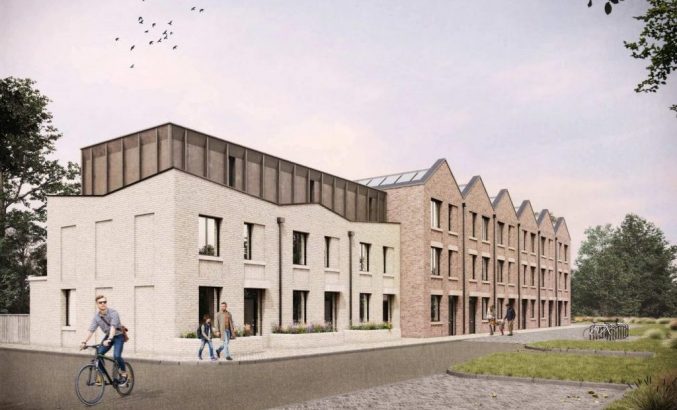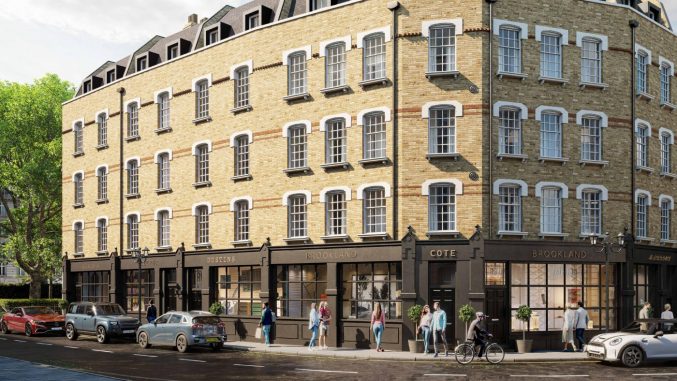How the Budget changed the 2021 property game
By Laura Miller

Bricks and mortar giveaways were the centrepiece of Rishi Sunak’s Spring Budget, signalling government priorities and forecasted to grant a reprieve for residential and commercial property markets for the rest of the year.
Fears of an up to 8% fall in house prices in 2021, from the Office of Budget Responsibility (OBR), and expectations of a destruction of value in large parts of the commercial property market, have been thrown into at least temporary reverse by the Chancellor’s fiscal update. In a Budget that sought to begin taking back some of the £280bn stimulus expended by the Treasury to stave off the worse economic effects of coronavirus, home buyers and physical businesses were rare winners.
Residential property gained an extension of the stamp duty holiday on purchases up to £500,000 until June, then the exemption limit doubled to £250,000 until September, and a new government-backed 95% mortgage guarantee scheme for properties, old and new, worth up to £600,000, for any buyer, not just first-timers. Commercial property got ongoing relief on business rates for retail, leisure and hospitality until July 2021, and up to two thirds off their rates until March 2022, capped at £2m, primarily targeting the smaller and medium sized companies that look most vulnerable to default. As a result the OBR revised its prediction for 2021 house prices sharply up to a 5% rise. Analysts at PwC called the business rates relief “a lifeline”, as restarting rates charges while businesses remain unable to trade would have been “the final straw for many”, averting reasonable expectations non-payment of rent would have increased.
The Budget announcements could also lead to a second wave of buy-to-let investments. In the fourth quarter of 2020, according to HMRC data, 61,800 buy-to-let properties were purchased, the highest quarterly figure since 2017. The SDLT holiday was a significant contributor to this upturn in property transactions, with buy-to-let investors purchasing 102,267 properties since the stamp duty holiday came into effect in July 2020. Imogen Lea, a tax consultant at Wilsons, said: “We could see more sustained growth in buy-to-let investments in parts of the country where property prices are lower, or in smaller dwellings.”
Landlords have been heartened, too, that pre-Budget rumours the Chancellor would raise capital gains tax rates to equalise them with the marginal rates of income tax, in some cases seeing them double, proved unfounded. Phil Greaves, co-founder of student accommodation provider UniHomes, said: “For once the government has decided to ease the pressure on the throats of hard pressed landlords in recent years.” The current property letting class are similarly optimistic the end of lockdown will see young professionals, many of whom have spent much of the crisis staying at their parents’ homes, return to renting in city centres. Future landlords may emerge out of the £100bn in “excess savings” wealthier households have amassed during pandemic lockdowns, according to the Bank of England’s chief economist, which will likely be seeking a home. “Interest rates in the UK are likely to remain low for the foreseeable future, which should attract more investment to the residential property market versus virtually zero interest on bank deposits and UK government bonds,” said Lea.
Sellers have held off putting their homes up for sale, according to the February 2021 RICS UK Residential Market Survey, due to the ongoing lockdown. For the second month in a row, the number of new buyer enquiries fell in February, with the net balance coming in at –9%, (up from -29% in January). The number of properties being listed for sale also fell for the second consecutive month, with respondents anecdotally citing the current lockdown restrictions and waiting on clarity about the stamp duty holiday extension for the reasons behind the fall in appetite. Following the Budget announcements, that is now expected to change. Sarah Coles, personal finance analyst, Hargreaves Lansdown, said: “Homebuyers have been released from their ‘wait and see’ limbo, and are set for a spring surge.” Details of the stamp duty holiday extension emerged when three quarters of the RICS survey was already complete, but those who replied afterwards expected it to have a material impact, as buyers and sellers to rush back to the market to take advantage of the tax break. “Houses with gardens, in market towns and villages, and with space for homeworking and home-schooling are particularly in demand, so we can expect the price rises of detached houses to continue outstripping those for flats in the coming months,” added Coles.
UK housing value hit a record high of £7.56 trillion in 2020,more than four times the value of all companies in the FTSE100, according to a new report by estate agent Savills. This is £380bn higher than 2019, the fastest increase since 2015. The North of England saw its strongest growth since 2005 with a £59bn gain. London and SE account for around £1.8trn and £1.4trn respectively (23% and 18% of the total). The value of mortgaged owner occupied homes passed £2.5 trillion for the first time, driven by support from the Bank of Mum and Dad, longer mortgage terms, and the support of Help to Buy. “The mortgage guarantee scheme announced in last week’s Budget will boost this figure further,” the estate agents said.
The Budget measures have not been universally welcomed. John Eastgate, managing director of property finance at Shawbrook Bank, said the stamp holiday extension will only serve to underpin an extended period of artificially inflated transaction levels. “The market didn’t really need an extension, it needed a graceful exit. Demand is strong and strengthening, and as we emerge from lockdown we should expect, as a minimum, house prices to remain resilient,” he said. Questions have also been raised about the logic of handing out 95% mortgages, which provide little in the way of a guard against negative equity, as the country proceeds into a period of acute economic uncertainty. Islay Robinson, CEO of high-net-worth mortgage broker Enness Global Mortgages, warned 95% mortgages “take the market into pretty overheated, dangerous territory”. He said: “We’ve previously seen the results of this kind of precarious lending to those who aren’t really in the financial position to commit to it, and many lenders have already tightened their belts in terms of their high loan to value offerings”. Lloyds, NatWest, Santander, Barclays and HSBC will offer these mortgages from next month, however, with Virgin Money to follow shortly.
The mortgage guarantee scheme only runs until the end of 2022, and the Treasury needs to give some thought to how it weans the property market off taxpayer support after that date, or alternatively commits to stimulus for the long term. “Otherwise, it is just delaying the inevitable day of reckoning, when the property market will have to stand on its own two feet,” said Laith Khalaf, financial analyst at AJ Bell. When that day comes, those who miss out on government support will likely look back at those who enjoyed it with envy and legitimate frustration. “If property prices continue to consistently rise above wages, Generation Rent is simply a mantle that will pass from one generation to the next,” Khalaf added.
These are mid to longer term problems. In the next 12 to 18 months the government is gambling a combination of pent up demand, a desire among wealthier households to invest lockdown savings, and the Budget property market triple stimuli, will coincide with a rebound in the country’s economy as lockdown restrictions ease, with the overall effect a virtuous wave of consumer spending to boost the back pockets of businesses and individuals alike. “There is a long list of related industries, including finance and insurance providers, house movers, furniture and garden retailers, that also stand to benefit from the Budget’s property measures. This could provide a welcome economic boost as the pandemic restrictions are due to ease and is just in time for the summer,” said Jamie Ward, head of stamp duty at PwC.
Property markets in London and the South East are, in particular, expected to benefit. Even before the Budget, in February estate agents Knight Frank reported quarter-on-quarter sales growth for the seventh consecutive month in prime outer London, driven by demand for more space. Average prices in Belsize Park, Dulwich and Wimbledon have risen by 4% since last April, and in the year to February there were 1.1% more transactions in prime outer London than the previous 12-months, despite the market being closed for eight weeks last year. With prices and demand already higher than a year ago, escaping thousands of pounds in stamp duty, or having to find only a 5% deposit, in the notoriously expensive capital, are highly attractive incentives that are expected to excite further demand.
Prime central London has fared worse; transactions in the year to February were 20% down on the previous 12-months, with prices flat in the preceding three months and down 4.4% annually, though most of this decline was recorded in the early months of the pandemic; average prices have only fallen by only 0.1% since the market reopened last May, Knight Frank said. However, as the estate agents pointed out, with passenger numbers through Heathrow down by 80% to 90%, activity in the prime central London property market has been disproportionately impacted. Tom Bill, head of UK residential research at Knight Frank, said: “A gap is opening up between price growth in central and outer areas of the capital, but that will close as international buyers can get back on aeroplanes.” According to the current end-of-lockdown roadmap, the stamp duty extension and introduction of 95% government-guaranteed mortgages will coincide with this lifting of restrictions on international travel, supporting the prime central London market from all sides.
For landlords, Knight Frank reported the number of tenancies started in the first two months of this year was 5% higher than last year, as tenants take advantage of falling rents. Rental values in prime London markets have fallen, it added, because demand from international students and corporate tenants has fallen, connected to the dramatic drop in passenger numbers through Heathrow. Meanwhile, a high level of short-let properties transferring to the long-let market has driven supply higher, with market valuation appraisals up by two-thirds on last year. However the property agents are forecasting a change in landlords’ favour. “There are early signs these trends may only have a number of months left to run,” it stated.
On the supply side, the government has said staycations may be allowed from the middle of April, and Knight Frank’s position is this will eventually reduce the quantity of stock on the long-let market, adding though, there is a certain amount already in the system that will take time to unwind as tenancy agreements expire. “The picture we are getting is of increasing optimism for the spring and particularly the summer,” said John Humphris, head of relocation and corporate services at Knight Frank. He added for commercial property, many corporates have plans that were put on hold and they are now considering re-activating them, with tech and media companies leading the way. “There are some question marks over the impact of new Covid-19 variants, but the success of the UK’s vaccine rollout has been a strong boost for sentiment in the rest of the world,” Humpris said. Add to the mix the Budget extension on rates relief for retail, leisure and hospitality until March 2022, and commercial property appears stablised.
For bridging the Budget measures, and subsequent cash injection expected into property, opens up several opportunities. A potential resurgence for the BTL market may lead more landlords to bridging loan lenders for finance, to increase rental yield by adding additional bedrooms to properties through refurbishments; last year lenders witnessed strong demand from those adding value to their existing buy to let property portfolios, according to data from MT Finance. Commercial premises in sectors lifted out of business rates, and which will enjoy rate reductions until 2020, may now avoid being abandoned – though following the Covid-induced work from home revolution, may need to be quickly developed into more usable spaces for the future, expanding a key business line for the bridging loan sector.
The biggest demand, however, may be for bridging to step in and provide emergency funding to salvage stressed chains as buyers try desperately to beat first the June, then September, stamp duty holiday deadlines. Two weeks before the Budget, Rightmove estimated 100,000 buyers faced shock stamp duty tax bills because they would miss out on the end of March cut off, with some estimates suggesting one in five deals would collapse as a result. While the extensions will have alleviated some of that pressure for current buyers, new buyers are expected to try to complete in the next six months to avoid the tax, creating fresh pressures. “My advice is for buyers and sellers to act sooner rather than later. Three months may seem like a substantial amount of time, but with mortgage providers taking longer to process applications, loan delays could increase the risk of transactions not being completed in time,” said Paresh Raja, CEO of Market Financial Solutions. In the two months following the initial announcement of the stamp duty holiday on 8 July, a survey by MFS revealed 32% of prospective buyers had been denied a mortgage. Paul Stockwell, chief commercial officer at Gatehouse Bank, said: “It’s becoming evident the stamp duty holiday’s stay of execution will mean sustained high levels of mortgage activity through to the summer.” With schools reopening and the weather improving, bridging should prepare for another busy house hunting season.

Laura Miller is a freelance journalist who writes about money and business. She regularly appears in UK national and trade newspapers and magazines, and has previously worked for ITV News and the Telegraph among others. Find her on twitter @thatlaurawrites










You must be logged in to post a comment.